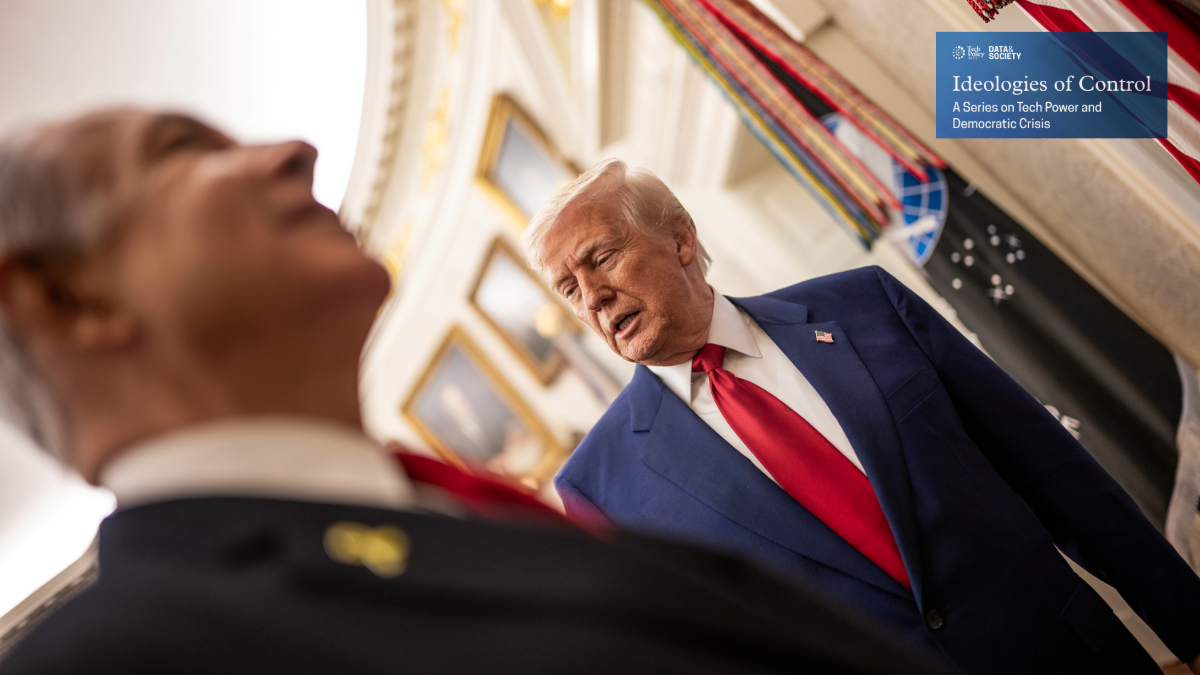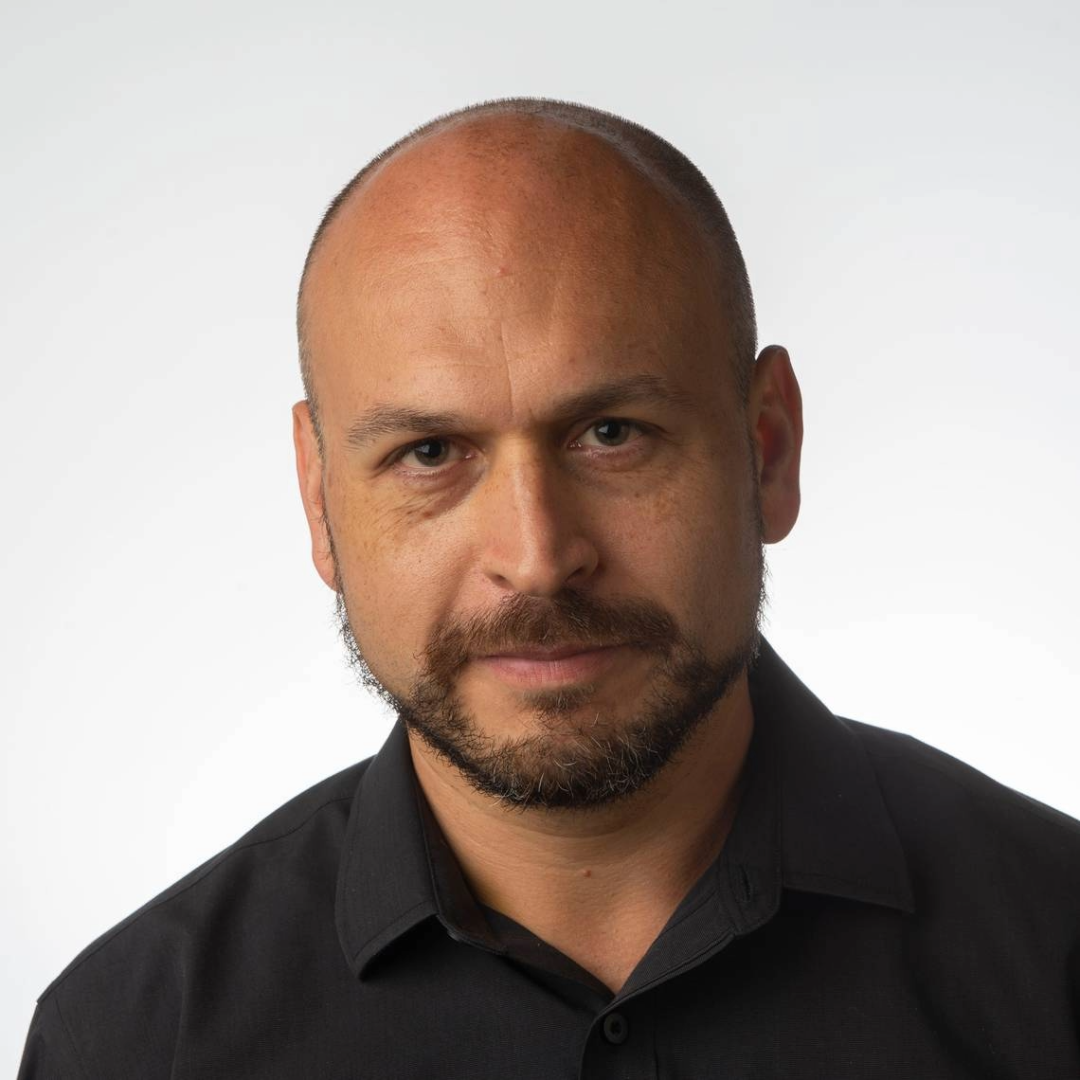Trump’s Gaza Fantasy and the Network State: The Tech-Fueled Future of Privatized Sovereignty
Gil Duran / Jun 6, 2025This piece is part of “Ideologies of Control: A Series on Tech Power and Democratic Crisis,” in collaboration with Data & Society. Read more about the series here.

US President Donald Trump greets Israeli Prime Minister Benjamin Netanyahu, Monday, April 7, 2025, in the West Wing Lobby of the White House. (Official White House photo by Daniel Torok)
The President of the United States openly fantasizes about putting a Trump luxury resort in Gaza. Praxis — a company funded by Marc Andreessen, Sam Altman, and Peter Thiel — wants to build a tech-owned city on Greenland. Elon Musk just got his own private city, called Starbase, in Texas. Coinbase CEO Brian Armstrong has urged the president to make good on his campaign pledge to build ten so-called “Freedom Cities” on federal land.
Why do Trump and some of his most fervent tech billionaire backers want to take land and create privately-controlled zones? Their dystopian visions reflect an ideological project called “The Network State,” which seeks to create private, corporate-controlled cities that operate as “startup nations”—places where democracy, regulations, and taxes won’t apply. It’s billed as innovation, but it’s really about escape: a billionaire bunker system to opt out of democracy and public accountability.
These aren’t just company towns, and they certainly aren’t zones of “freedom.” They are better described as fascist cities — autocratic playgrounds where the ultra-rich and corporations make all the rules. The core concept was formalized by Balaji Srinivasan in his 2022 book The Network State: How to Start a New Country. But many of his ideas resemble earlier work by Curtis Yarvin, sometimes referred to as Peter Thiel’s “house philosopher,” who in 2008 wrote a notorious essay called “Patchwork.” (For more on Yarvin’s ideas and their influence, see my earlier writing in The New Republic.)
The idea also traces its roots to The Sovereign Individual, a doomsday-libertarian manifesto from 1997 that predicted the collapse of nation-states and the rise of private micro-nations. Thiel was so impressed, he wrote the foreword to the 2020 reissue.
Srinivasan’s version wraps these ideas in startup language, offering two routes (cribbed from sociologist Albert O. Hirschman) to exiting democracy and entering a future where capital governs and the public is shut out.
- Voice: Use tech money and influence to capture governments through elections.
- Exit: Acquire new land and build from scratch—ideally in legally exempt “special zones.” Srinivasan calls this “Tech Zionism.”
This ideology burst into public view on May 15, when Trump proposed a shocking plan: to effectively ethnically cleanse Gaza and turn it into something called a “freedom zone.”
“I have concepts for Gaza that I think are very good,” Trump said during a trip to the Middle East. “Make it a freedom zone. Let the United States get involved and make it just a freedom zone. I’d be proud to have the United States have it, take it, make it a freedom zone.”
This was not idle talk. Trump justified his plan by pointing to Gaza’s destruction. “There’s practically no building standing,” he said. “People are living under the rubble… which is not acceptable.” In other words, the land is cleared, ripe for conquest.
The next day, the press reported that the Trump administration is considering the forced relocation of one million Palestinians to Libya.
This is not the first time Trump has lusted after Gaza. “The US will take over the Gaza Strip,” he said during a February press conference with Israeli Prime Minister Benjamin Netanyahu. “We’ll own it... the Riviera of the Middle East.” He later shared an AI-generated video of a dystopian Gaza, complete with a Trump resort, a golden statue of himself, and dollar bills raining from the sky.
Trump’s Gaza fantasy fuses necropolitics with venture capital. Flatten a place, declare it “free,” and auction it to the highest bidder. This is the Network State in its most ghoulish incarnation: a tech-fascist casino built atop genocide and displacement.
Gaza isn’t the only site of this tech colonialism impulse. The Network State’s backers have already created a prototype, called Próspera, a privately run “charter city” in Honduras that operates under a separate legal system. (Próspera is currently suing the Honduran government for nearly $11 billion after the new administration attempted to dismantle an agreement made by a corrupt right-wing government following a 2009 coup.
In his official campaign policy platform, Trump announced plans to build ten “Freedom Cities” on US federal land. The language mirrors the Network State doctrine almost exactly.
“President Trump will work to open up the American Frontier, holding a contest to charter new cities where families and individuals can have a new shot at the American Dream,” his website proclaims.
This gameshow-style “chartering contest” is a nod to the accelerationist tech ideology sweeping Silicon Valley. It’s a page straight from the Pronomos Capital playbook—a venture fund started by Patri Friedman (Milton Friedman’s grandson) and backed by Thiel, Andreessen, and Srinivasan. Their promise? “Better laws” for “better lives.” Translation: carve out zones where democracy doesn’t apply and billionaires set the rules.
Coinbase CEO Brian Armstrong, a vocal Network State advocate, recently tweeted his support for such zones: “We should designate ~10 or so… across federal land, each with its own exemption from federal and state law.”
Even military bases are in play. Palmer Luckey, founder of the defense firm Anduril, proposed turning Guantanamo Bay into “Liberty City”—a “tropical brain-drain machine that accelerates regime collapse in Havana.” He described it as the “Singapore of the Caribbean.” Armstrong amplified the idea on Twitter.
While most mainstream outlets have failed to investigate these proposals and provide the necessary context, they won’t be able to ignore them much longer. This is a clear campaign to normalize privatized sovereignty—and Trump is the perfect vehicle.
Trump likely hasn’t read Srinivasan or Yarvin. He doesn’t need to. Trump sees what the Network State offers him: real estate, unchecked authority, and limitless branding opportunities. He’s already planning to sell off federal land. And after calling crypto a scam, he and his family have gone all-in—with two crypto projects raising their estimated net worth by $2.9 billion in months.
Now, backed by tech billionaires and accelerationist ideologues, Trump is offering up democracy-free enclaves in exchange for campaign cash and future legacy monuments.
We’re watching the rise of a new anti-democratic extremism—networked, crypto-financed, and cloaked in the language of freedom. The Network State is not about liberty. It’s about power. It’s not a utopia, it’s a bunker. A fortress city with drone defense and unregulated biotech, where capital is king and citizenship is a subscription.
The people behind this movement—Thiel, Andreessen, Armstrong, Luckey—are not fringe figures. They are reshaping global policy with venture capital and ideology. And they’re betting big on the one man willing to sell the country to them, piece by piece.
Trump may not grasp the theory behind the Network State. But he embodies it: authoritarianism disguised as innovation. Sovereignty sold to the highest bidder. Capitalism without constraint. Fascism — maybe with flying cars.
The signs are no longer subtle. The Network State is not a fringe fantasy — it’s an emerging blueprint for tech-backed authoritarianism. The only question is whether we’ll stop it before it becomes the new reality.
Authors
